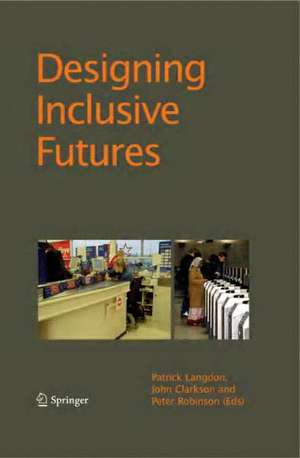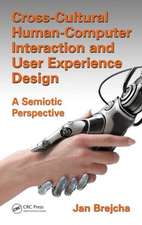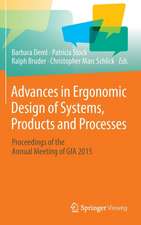Designing Inclusive Futures
Editat de P. Langdon, P. John Clarkson, P. Robinsonen Limba Engleză Hardback – 25 mar 2008
| Toate formatele și edițiile | Preț | Express |
|---|---|---|
| Paperback (1) | 1216.48 lei 43-57 zile | |
| SPRINGER LONDON – 13 oct 2010 | 1216.48 lei 43-57 zile | |
| Hardback (1) | 1222.62 lei 43-57 zile | |
| SPRINGER LONDON – 25 mar 2008 | 1222.62 lei 43-57 zile |
Preț: 1222.62 lei
Preț vechi: 1491.00 lei
-18% Nou
Puncte Express: 1834
Preț estimativ în valută:
234.02€ • 254.29$ • 196.71£
234.02€ • 254.29$ • 196.71£
Carte tipărită la comandă
Livrare economică 21 aprilie-05 mai
Preluare comenzi: 021 569.72.76
Specificații
ISBN-13: 9781848002104
ISBN-10: 1848002106
Pagini: 292
Ilustrații: XIV, 274 p. 91 illus.
Dimensiuni: 155 x 235 x 23 mm
Greutate: 0.59 kg
Ediția:2008
Editura: SPRINGER LONDON
Colecția Springer
Locul publicării:London, United Kingdom
ISBN-10: 1848002106
Pagini: 292
Ilustrații: XIV, 274 p. 91 illus.
Dimensiuni: 155 x 235 x 23 mm
Greutate: 0.59 kg
Ediția:2008
Editura: SPRINGER LONDON
Colecția Springer
Locul publicării:London, United Kingdom
Public țintă
Professional/practitionerCuprins
Understanding Users.- Converting Disability Data into a Format Suitable for Estimating Design Exclusion.- Using Constraints in the Understanding of the Interactions Between Products and Humans.- User Involvement and User Data: A Framework to Help Designers to Select Appropriate Methods.- Engaging the Ageing: Designing Artefacts to Provoke Dialogue.- Biomechanical Analysis of Opening Glass Jars: Using Kinematics.- Building a Consumer Network to Engage Users with Disabilities.- Inclusive Design.- Help or Hindrance: The Use of Tools for Opening Packaging.- The Sound of Inclusion: A Case Study on Acoustic Comfort for All.- Designing an Inclusive Pill Dispenser.- Prior Experience of Domestic Microwave Cooker Interfaces: A User Study.- Prior Experience and Intuitive Use: Image Schemas in User Centred Design.- Sustaining Autonomous Living for Older People Through Inclusive Strategies for Home Appliance Design.- Computer Access and New Technologies.- Investigating the Security-related Challenges of Blind Users on the Web.- Access Barriers to Wireless Technologies for People with Disabilities: Issues, Opportunities and Policy Options.- Gaze Interaction with Virtual On-line Communities.- The Resolution Race: Perpetuating Inaccessible Computing.- Assistive Technology.- A Case Study of Simulating HCI for Special Needs.- User-led Design of Technology to Improve Quality of Life for People with Dementia.- Photonote: The Making of a Classroom Adaptation System.- FES Indoor Rowing and On-water Sculling.- Universal Access to Shopping: Apparel Acquisition Preferences for the Working Woman with Physical Disabilities.- Inclusive Environments.- Is Remodelled Extra Care Housing in England an Inclusive and ‘Care-neutral’ Solution?.- Designing for an Ageing Population: ResidentialPreferences of the Turkish Older People to Age in Place.- Universal Design Patterns and Their Use in Designing Inclusive Environments.- User Friendly Living Environmental Research and Design for Older People.
Textul de pe ultima copertă
Designing Inclusive Futures reflects the need to explore, in a coherent way, the issues and practicalities that lie behind design that is intended to extend our active future lives. This encompasses design for inclusion in daily life at home but also extends to the workplace and for products within these contexts. For example, given trends in employment sector growth, skills requirements, labour supply and demographic change, there is a need to predict the critical areas where individual capabilities are mismatched with the physical, social and organisational demands of work. This mismatch, which can be addressed within the domain of inclusive design, is pervasively linked to real artefacts in workspaces and their intersection with the health factors that relate to ageing. This book is the result of the fourth CWUAAT workshop held in Cambridge, England in April 2008.
Contributions address the following themes:
• Understanding Users
• Inclusive Design
• Computer Access and New Technologies
• Assistive Technology for Working and Daily Living Environments
• Inclusive Environments
The nature of the contributions reflect a sample of the work of leading national and international researchers in the fields of Inclusive Design, Ergonomics, Universal Access, and Assistive and Rehabilitative Technology. There have been significant contributions from researchers in architecture, social housing provision, and apparel and fashion design, reflecting the need to understand the wider social and economic context of inclusive and assistive technology design.
Contributions address the following themes:
• Understanding Users
• Inclusive Design
• Computer Access and New Technologies
• Assistive Technology for Working and Daily Living Environments
• Inclusive Environments
The nature of the contributions reflect a sample of the work of leading national and international researchers in the fields of Inclusive Design, Ergonomics, Universal Access, and Assistive and Rehabilitative Technology. There have been significant contributions from researchers in architecture, social housing provision, and apparel and fashion design, reflecting the need to understand the wider social and economic context of inclusive and assistive technology design.
Caracteristici
Represents developments in the field from the past 5 years Provides practical examples and methods of application of inclusive design Offers an international perspective on inclusive design and assistive technology from leading researchers in the field Includes supplementary material: sn.pub/extras

















